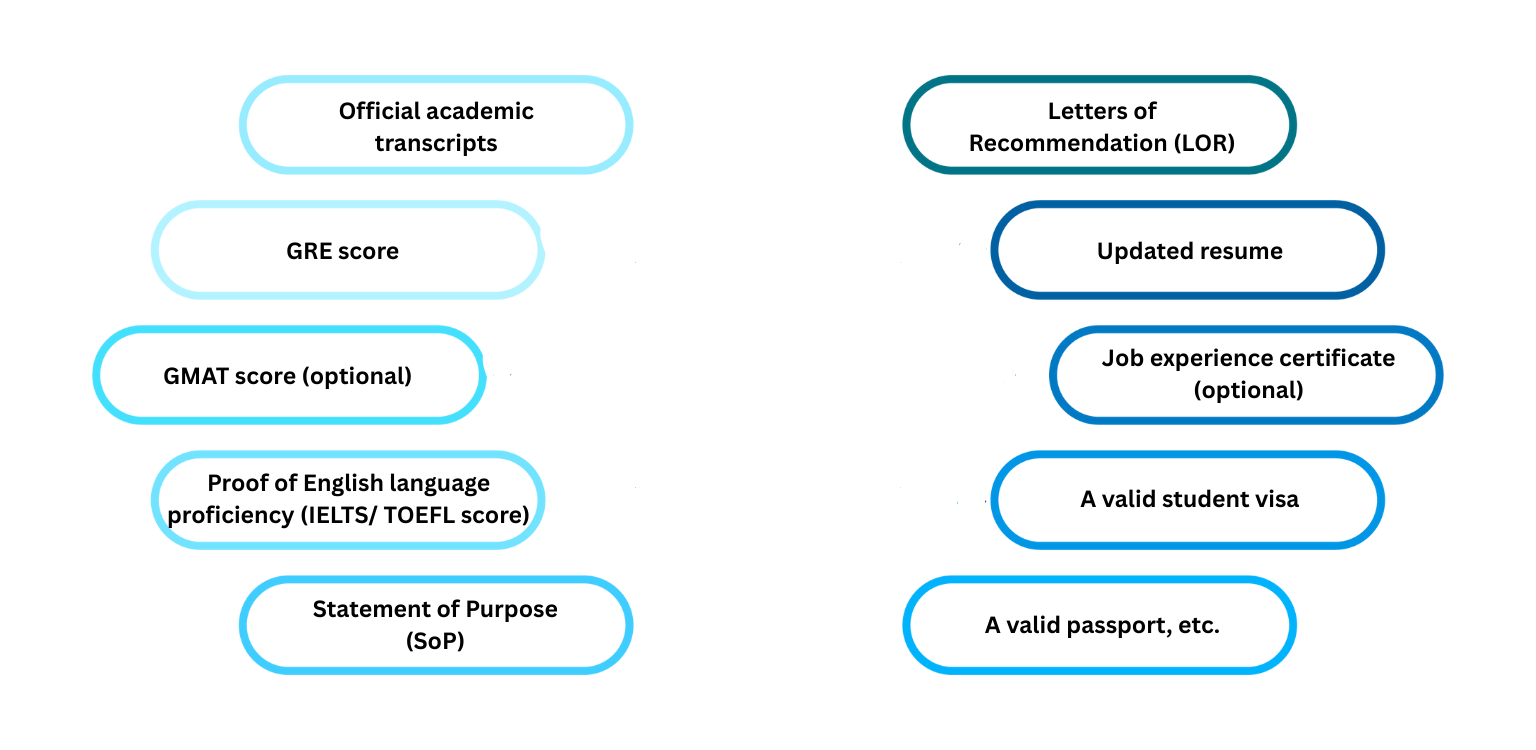- Why Learn Cloud Computing?
- Increasing Demand For Cloud Computing MS Programs
- Best Colleges to Study MS in Cloud Computing in the US
- Eligibility for MS in Cloud Computing in the USA
- Documents required for studying MS in Cloud Computing in the USA
- Best Colleges to Study MS in Cloud Computing in the US: Rankings and Fees
- Job prospects after pursuing MS in Cloud Computing in the US
- Advantages of Studying MS in Cloud Computing in the US
As the world is making an aggressive digital shift, more and more businesses are migrating their operations to the cloud for greater convenience, accessibility, and flexibility in managing information.
Cloud computing allows businesses to store, manage, and access their data and software on the Internet. This way they do not need local storage on their computers, and anyone can access the data from anywhere. As per the report published by Market.us, the cloud computing market is expected to exceed USD 2,321.1 billion by 2032, with an estimated CAGR of 16% from 2023 to 2032.
In this blog, we will delve into the reasons why studying MS in cloud computing in the US can be a smart career move.
Why Learn Cloud Computing?
Increasing adoption of cloud storage and advancements in cloud computing technology like AI, machine learning, IoT, etc, is driving the demand for professionals skilled in designing, deploying, and maintaining cloud infrastructure.
Here are the reasons, why this is a great time to make a career in cloud computing:
- Flexible Job Options: Due to the wide-ranging applications and scalability, cloud computing offers a variety of job options. Professionals get the opportunity to explore various career paths in large companies and startups.
- High Salaries: Cloud computing jobs offer higher salaries compared to other prominent tech roles due to the specialized expertise required. Businesses use competitive salaries to attract top talent, with cloud architects earning an average annual salary of $120,000-140,000 in the US.
- Job Security: Growing reliance on cloud infrastructure and services by companies necessitates skilled cloud professionals. Their expertise is vital to optimize and maintain systems, resulting in a stable job market in the field.
Increasing Demand For Cloud Computing MS Programs
Pursuing a Master’s program in cloud computing is a great way to gain specialized expertise, industry relevance, and hands-on experience, to get yourself job ready for various cloud computing roles.
Here are some career prospects and opportunities that you may encounter with a cloud computing MS program:
- Cloud administrator
- Cloud Architect
- Cloud engineer
- DevOps Engineer
- Consultant
- Security specialist
- Data scientist
- Data Engineer/Analyst
- Entrepreneurship
Best Colleges to Study MS in Cloud Computing in the US
A career in cloud computing holds great potential for STEM students. Several top colleges in the US offer excellent MS programs in cloud computing that are renowned to have cutting-edge research opportunities, great faculty, and a strong network within the industry.
Some of the best colleges in the US known for their cloud computing programs are:
- Stevens Institute of Technology
- Capella University
- George Washington University
- Stanford University
- University of Texas at Austin
- Illinois Institute of Technology
To choose a college for yourself, it is vital to research its program offerings. Alongside this, consider their admission requirements and curriculum to find a college that best fits your needs and interests.
Eligibility for MS in Cloud Computing in the USA
In order to pursue an MS in Cloud Computing in a top US university, a candidate is required to fulfill the following eligibility criteria.
- A bachelor’s degree from a recognized university(not necessarily in Computer Science), with a minimum of 3.0 GPA
- A minimum GRE score of 290 in Quantitative + Verbal and 2.5 in Analytical Writing
- TOEFL score (79 or above)/ IELTS score (6.5 or above)/ PTE score (55 or above)
- A valid GMAT score (not asked by all universities)
- Successful completion of at least one calculus course
- Work experience (not asked by all universities)
- A valid student visa
Documents required for studying MS in Cloud Computing in the USA
Here’s a list of essential documents needed to seek admission to a recognized US university to pursue an MS in Cloud Computing, and during the visa application process.

Please note: For a precise list of documents, please visit the official university website.
Best Colleges to Study MS in Cloud Computing in the US: Rankings and Fees
The following table includes the list of the top five colleges in the US for pursuing an MS in Cloud Computing along with their ranking and average annual fees. On average, the annual tuition fees for pursuing the course in the United States will cost you around $30,000 to $40,000.
| Institute name | QS World University Rankings 2024 | Average annual tuition fees |
| Stevens Institute of Technology | 621-630 | $ 40,000 approx. |
| Capella University | – | $ 34,000 approx. |
| George Washington University | 340 | $ 35,000 approx. |
| Stanford University | 5 | $ 38,000 approx. |
| Illinois Institute of Technology | 469 | $ 30,000 approx. |
Please note: The tuition fees mentioned here are subject to change. Please visit the official university website for the latest updates.
Job prospects after pursuing MS in Cloud Computing in the US
According to the Bureau of Labour Statistics, employment in the computer and information technology sector is expected to rise by 13% between 2023 and 2030.
After completing an MS in Cloud Computing successfully from a recognized U.S. university, there are a plethora of job options that you can avail yourself of. The following table enlists some well-paying job options.
|
Job title |
Average annual salary in USD |
| Cloud Business Analyst | $130,000 approx. |
| Cloud Product Manager | $100,000 approx. |
| Cloud Network Architect | $97,000 approx. |
| Cloud Developer | $93,000 approx. |
| Cloud Consultant | $92,000 approx. |
| Cloud Software Engineer | $88,000 approx. |
Please note: The salaries mentioned here are for your reference only. The actual salary might vary.
Advantages of Studying MS in Cloud Computing in the US
- Transformative Education: The US is home to prestigious universities. Choosing to study MS in cloud computing in the US will expose you to excellent cloud computing programs that can change the trajectory of your career.
- Increased Global Reach: A Master’s degree in cloud computing from a reputable US institution is highly regarded globally. It enhances professional reputation and expands career prospects internationally.
- Access to Tech Advancements: Being a hub of technological innovations, studying in the US gives you access to the latest technologies, tools, industry practices, and latest trends in cloud computing.
- Networking And Collaboration: In the US, universities host networking events, and conferences to allow students to connect with a diverse network of faculty members and industry professionals, building network and collaboration opportunities.
- Gateway to Opportunities: Most of the companies who are seeking cloud computing professionals have their offices in the US. Being in the US will allow you to secure internships, co-op programs, and job placements in reputed companies.
- Cultural Enrichment: The US boasts a diverse multicultural environment, where different cultures and perspectives thrive. Studying in the US helps enhance your adaptability levels and broaden your horizon. It dramatically helps in your personal growth.
If you want to know more about the career possibilities in Cloud Computing in the US and how you can proceed with it, our professional consultants at LilacBuds will help you navigate the process smoothly. Reach out to us for further details.
Explore Other Master’s Programs
Data Science Computer Science Cybersecurity
Cloud Computing Masters in Finance















